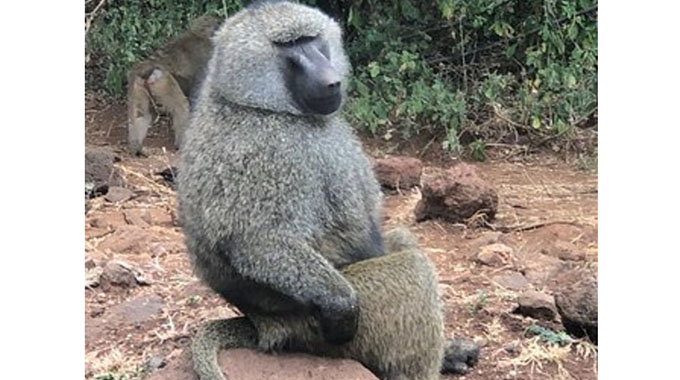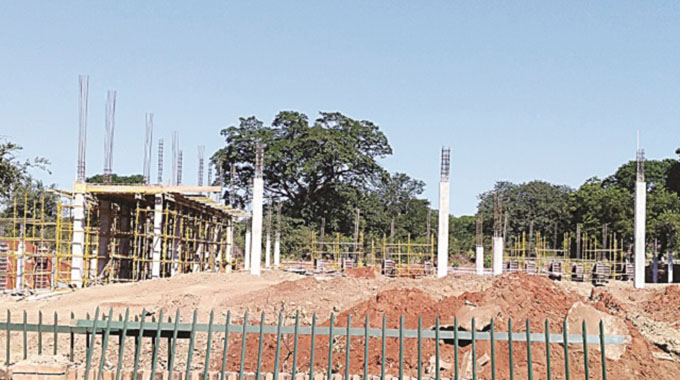Home thoughts from Nairobi

David Mungoshi Shelling the Nuts
I was last in Kenya some 17 years ago, in 1991. I remember that visit as if it were yesterday. Walking along Dedan Kimathi Street in Nairobi, after reading Ngugi and Micere Mugo’s “Trial of Dedan Kimathi” evoked so intense an immediacy that it felt like Kimathi himself was there on the street named after him, his thoughtful face demanding attentive introspection.
You cannot but conclude that indeed the freedom of his people was worth the loss of his life. You get to feel that colonialism killed the body, but not the soul.
Kimathi is alive and well on his street and in the hearts of many people, Kenyans and non-Kenyans alike.
My trip to Kenya in 1991 was the second long-haul flight I had ever been on.
Previously, I had only been on short bumpy flights, by viscount, to and fro Harare to Bulawayo.
My first long flight had been to Mobutu’s Zaire, years after the 1974 Ali-Foreman “Rumble in the Jungle” on a hot Kinshasa night when a youthful George Foreman failed to use his devastating punching power against Ali, a super athlete and wily ringmaster known as the Louisville lip because of his loud effortless flow of self-adulatory free style poetry lines.
In 1963, Ali had enthused against Sonny Liston with the words: “Yes sir, I’m gonna float like a butterfly and sting like a bee.”
The trip from Harare to Kinshasa aboard a now defunct French airline is now rather hazy in my mind.
Of course I remember the short stopover at what was then the Jan Smuts Airport, named in honour of the Boer general, who at the end of the Anglo-Boer War had philosophically told the vanquished Afrikaners: “Do not forget, but forgive where it is expedient for South Africa.”
Smuts went on to become Prime Minister of South Africa. These thoughts and events from the history of South Africa came rushing in when we landed at Jan Smuts, now OR Tambo. I remember us thinking that the drinks on offer in the restaurants were for free.
This was because of the self-service. Those who could pour the passion fruit or cocktail drinks into their glasses and drink quickly had themselves a field day.
I could only stare and wonder, being the shy reticent type. On leaving Johannesburg, they gave us wine from French wineries and before too long, I was too inebriated to care. That is why I remember so little of the flight itself.
But the flight to Kenya was something else. By that time I had begun to fancy myself as some kind of veteran when it came to air travel. I had more or less transcended the limitations of my ghetto upbringing and experience and Dobie Gray’s haunting line: “If you could see me now; if only you’d see me now” kept ringing in my mind but with a very personal meaning.
When you are doing well, you cannot help but wish some of your mates from the ghetto can see you in your moment of triumph. Somewhere, high above the clouds, the pilot directed our attention to the snow-capped peak of Mount Kilimanjaro to our right.
The cameras went click, click, and click! I remembered this as we floated above some clouds and ploughed through others.
On a first flight, one is disabused of the mistaken notion that clouds are the ceiling of the sky. Some clouds hang so low, it is almost unbelievable. You look down upon them as you cruise quietly to your destination.
As we neared Nairobi last week, I experienced the same sensations as I did all those years ago. Looking at Mount Kilimanjaro, you feel the geography lessons of your primary school days come alive and suddenly everything is real and not just academic textbook stuff for clueless sweet stay-at-home types.
As we landed at the JKIA (Jomo Kenyatta International Airport), I wondered if I could, given the time and opportunity, identify the little pub at the JKIA where the barman had asked me where I came from.
When I quizzed him about his question, he said Kenyans drink their beer at room temperature: Tusker, White Cap, Guinness and so on. I had ordered a cold Tusker and that told him that I was a foreigner returning home.
After being cleared by immigration, I made my way out into the open air where I found an affable driver with a placard that said, “Dr David Mungoshi”. Out there, people are very respectful of anyone they deem educated. You are either a doctor or a professor!
JKIA is highly-mechanised. The driver paid his parking fee at dispensing machines that looked like slot machines.
These machines spoke Kiswahili. About 10 or so minutes later, we drove out and away along the road to Mombasa before we turned right towards a fast-growing upmarket area called Westlands and came to a halt on the grounds of the Westwood Hotel, a structure that blends in well with its immediate surroundings.
The hotel stands near the edge of Karura, a protected forest into which you can venture to see the monkeys and listen to birdsong. The area is protected like our Harare Botanical Gardens.
Before you can step into the forest, you cross a small perennial stream that I was told is one of several tributaries of the Nairobi River. A friend and colleague from one of the Kenyan universities told me that the word “Nairobi” describes a river coursing its way into the far distance through cool shady recesses along its way. Learning really never ends.
Everywhere the lights were beginning to glow us into a typical Nairobi life.
The lull is apparent only because Nairobi has a vibrant night life with numerous night clubs. The locals call them “joints” where there is a lot of music and dancing as well as wine and women for those on the prowl.
A girl told me that where she came from, marriage did not attract high value bride-appreciation gifts to the girl’s parents.
She also said if a prospective son-in-law gave money to the girl’s father, the money would, invariably, be returned because her father would say he was selling his daughter. Chitsva chiri muruoko — only when you travel do you get to learn new things.
Next day we had lunch in the garden and hordes of baby monkeys with thick grey fur, rascally little fellows came to play on the trampoline as if to do a display for fascinated humans.
The Karura monkeys are not like the monkeys in Zimbabwe. Their thick fur and grey colour blends in well with the forest. If you do not look closely, you might miss the monkeys sitting perfectly still on the ground or on a piece of granite rock jutting out of the ground.
It felt like home as images of the monkeys that used to roam my neighbourhood in Gweru flashed through my mind.
I could see then that we could have protected the monkeys and let them roam free like the ones in Victoria Falls.
The monkeys in Victoria Falls know when a passenger train is due and as the locomotive makes its way into the station, they leap up the train and sit on the roof to wait for the human cargo on the train to vacate its home on wheels.
Whatever crumbs and leftovers are left in the carriages, the monkeys will find and devour. As the foraging continues, the monkeys appear oblivious of the many human eyes on them and there is a beautiful kind of coexistence between us and what some among us prefer to call our close cousins.
The way the Westwood Hotel, the monkeys there and the silent stream making its way determinedly to the Nairobi River seem to blend in is a plausible model for people who share their environment with wild animals.
The cacophony of birds and insects is a natural sound track to an apparent work in progress in which the stars are humans and Mother Nature.
Pranksters might well observe in classically broken English:“If the Maasai did it, why can’t we did it also?”
Next day, as a friend and I sat at a table discussing the briefs from the Commission of the African Union that had brought us to these near pristine arrangements, two men left their table to talk to us.
They said they could not help but notice that our conversation was sprinkled with Shona words.
It was nice coming all the way from Harare to get to know each other in Nairobi. It seemed quite odd to me and so alien.
The things that people do! Before Independence, whites from the posh suburbs of the capital would drive past the home of a bereaved neighbour to go and post condolence messages in The Herald when it would have been a lot easier and more caring to just drop in and commiserate with their neighbours.









Comments